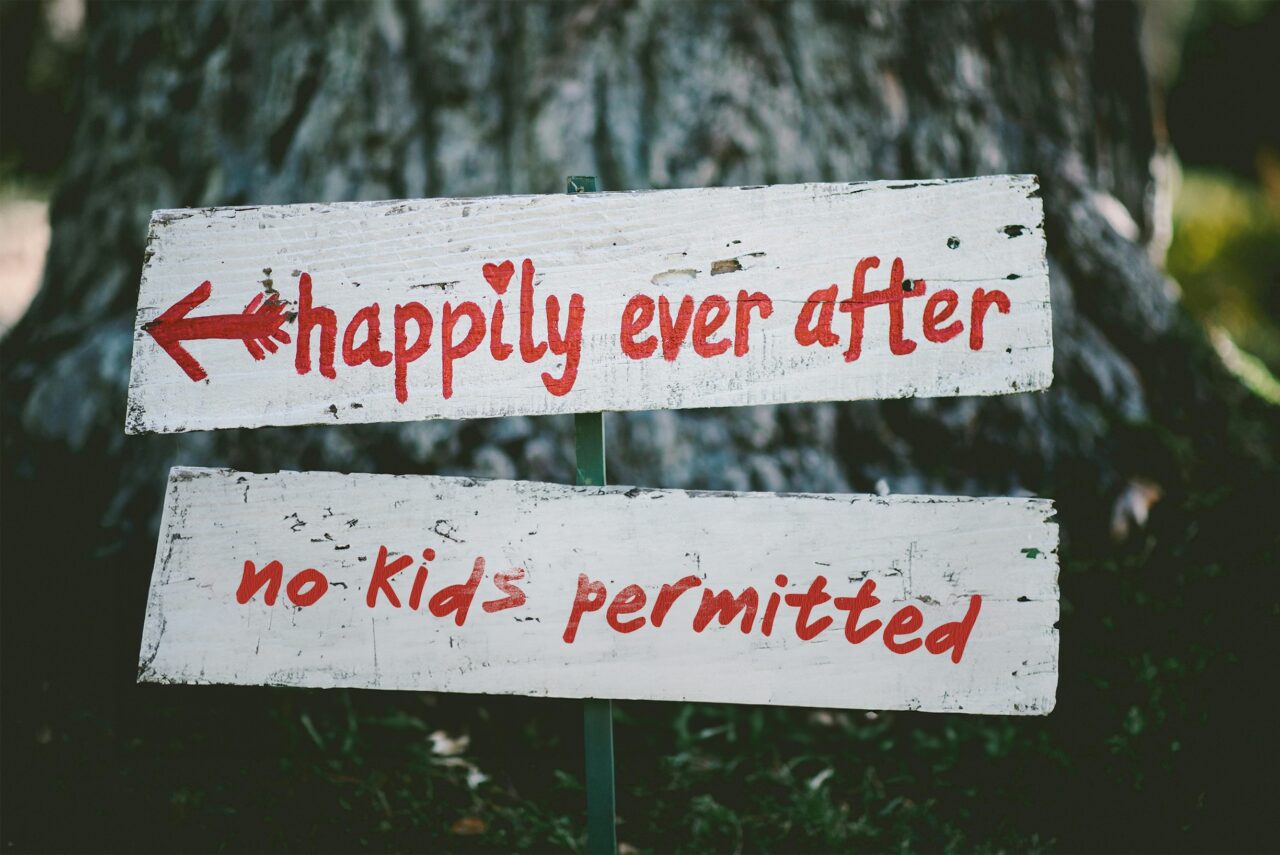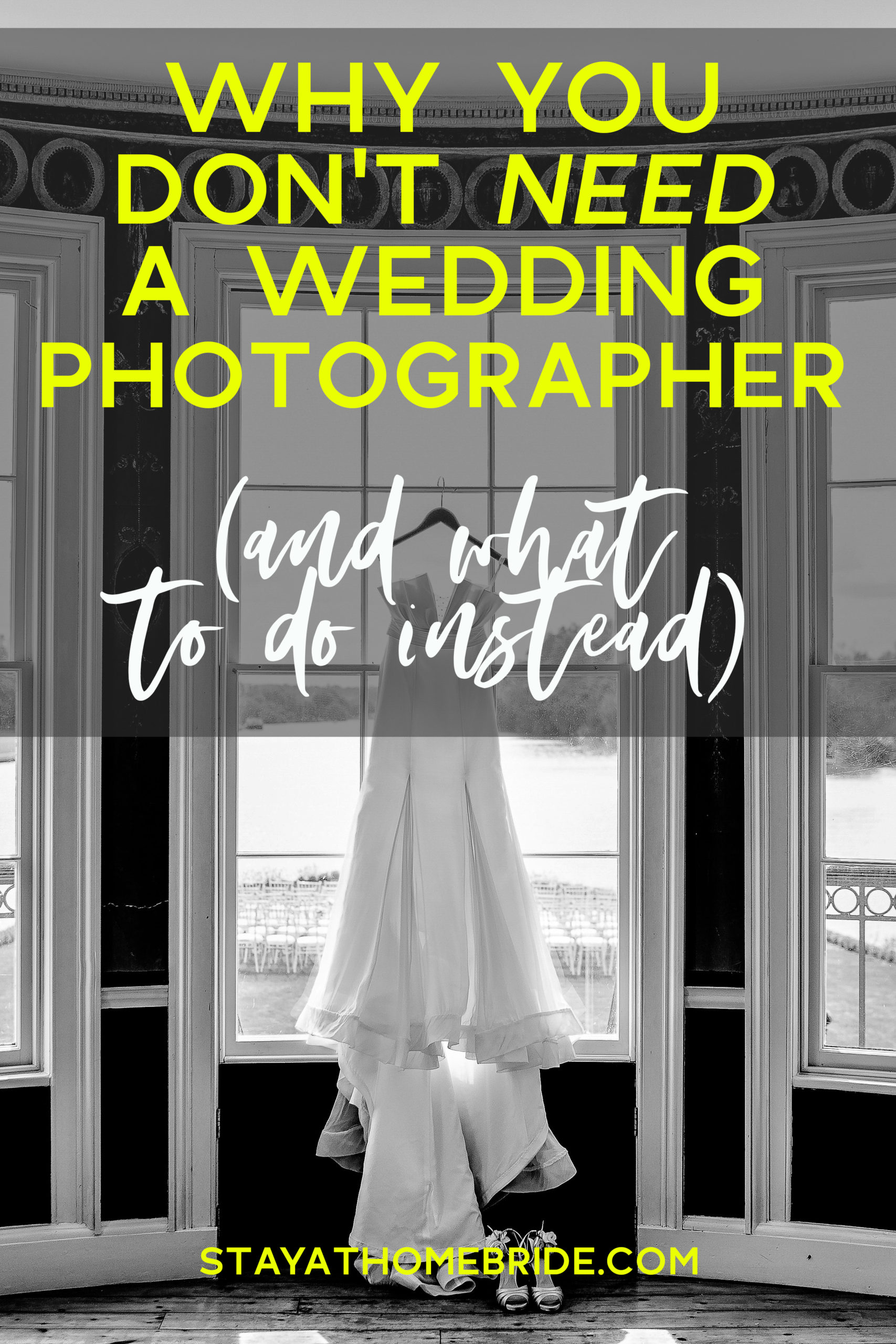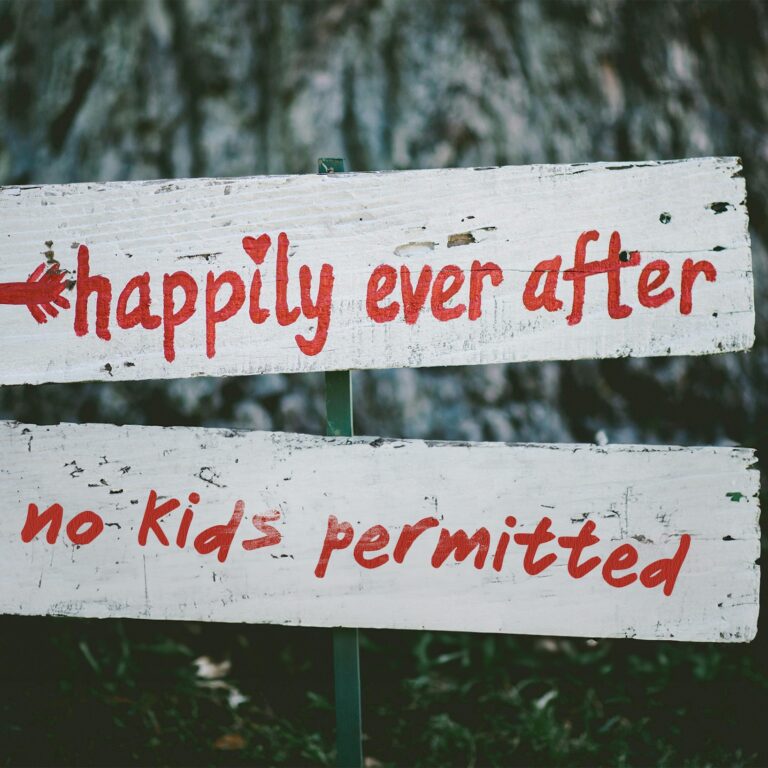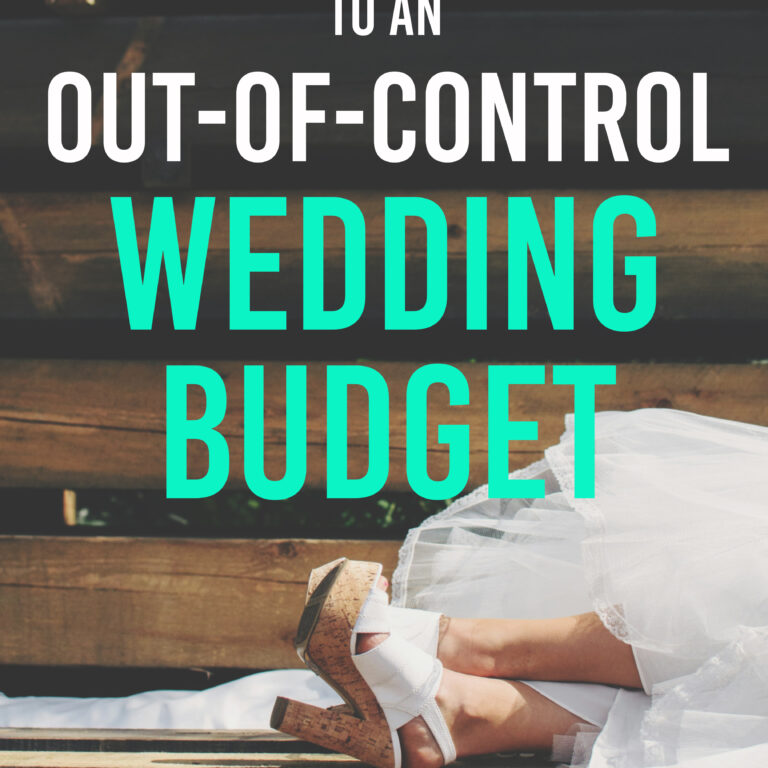Whether you love kids or avoid them like the plague, you might be considering a kid-free wedding.
Children get loud. Children get rowdy. They can run around underfoot and break things or cause distractions. Yes—even the sweethearts, sometimes. By contrast, most weddings are formal, quiet at specific moments, and designed with adults in mind, not kiddos.
So choosing to exclude children from your wedding makes perfect sense for some couples. Most people understand, whether they’re parents or not. In fact, a lot of parents understand the decision even more!
But some people get offended or upset at “no kids allowed” weddings. What’s their reasoning—and what can a bride do about it?
Why Are People Angry I’m Having a Child-Free Wedding?
If you’ve decided to have your ceremony and reception sans children, you might receive pushback and criticism. Some will be to your face, and quite a bit will occur behind your back.
Why do people get offended or upset by couples’ decisions to not invite kids to their wedding?
The main reason is inconvenience. It’s hard for some parents to find sitters, plus an additional expense if they do.
Others don’t want to or can’t leave their children for very long, due to special needs or nursing.
And finally, some just get offended because they take the decision personally. Others might feel the bride and groom are acting snobby or entitled by excluding children (even though that’s not the case).
No matter the reason, be prepared for your no-kids wedding to stir controversy here and there—and receive a few “Regretfully Declines” RSVPs from parents who can’t or won’t leave their little ones behind.
What’s a Child-Free Wedding? Does It Really Mean No Kids at All?
A kid-free or child-free wedding and reception means the events are off-limits to (usually) young children. As for exceptions to the rule, many couples include an age minimum. For example, you might see “Please, no children under 10” on the invitations.
If no age is given, it’s not considered rude to ask the couple directly what the limit is. Oftentimes, it’s simply, “Is your child old enough to sit still and quietly at the ceremony, and not run around underfoot at the reception?”
As a guest attending a child-free wedding, never assume your child is the exception unless one has been given.
What About Nursing Babies—Can They Attend a Kid-Free Wedding?
Usually, yes: most couples make this exception and allow breastfed babies to attend. But others decide “no kids” means none at all, even nursing infants.
Again, don’t assume your child is exempt from the rule. If you aren’t sure, feel free to ask.
11 Responses When Guests Are Upset Kids Aren’t Invited to Your Wedding
As the couple, you and your fiancé have to decide how to handle the criticism, feedback, and natural repercussions of announcing your child-free wedding (i.e., some guests not being able to attend).
You can either hold firm to your decision, or modify it as needed.
Here are 11 things to say or do when your kid-free declaration doesn’t get a warm welcome.
1. Hold firm, and enforce boundaries.
Your first option is to simply refuse to back down. Once you decide and announce you’re having a kid-free wedding and reception—that’s it, end of discussion.
It doesn’t mean people won’t try to convince you otherwise, or criticize your choice. Especially guests who’ve never attended kid-free weddings. The concept might be so novel, they’re genuinely shocked.
Others take personal offense, even ones without kids themselves. They may think you’re entitled or don’t like kids.
Enforce your boundaries: this is your and your fiancé’s decision, and no one else’s. You don’t owe anyone explanations. And you don’t have to defend yourselves.
If you choose to do so, however, know when to walk away from the conversation. Anyone who refuses to see your side, or threatens to break the rule and treat it as optional, is not worth the energy. They don’t deserve the benefit of an explanation, either.
In fact, they may not deserve an invitation at all—but again, that’s your decision.
2. Make an exception for nursing babies.
If you’re considering not having children at your wedding, you might decide on one exception: babies who are still breastfeeding.
Correction—exclusively breastfeeding.
Why? Because any babies or toddlers who nurse, but also take formula or other foods, don’t need exception. Whoever’s watching them has the means to feed them while their parents attend the wedding.
And yes, some exclusively-nursing moms can pump beforehand and leave a supply with the sitter, but some can’t. Also, this doesn’t solve the issue of missed feedings—where the mom needs to pump during the wedding or reception if her child isn’t there to nurse. It’s often easier just to bring the baby along.
If you make the exception and allow nursing babies at your wedding, set up a nursing station (a quiet side room, the bridal suite, etc.) where moms can feed their babies in private.
3. Set an age minimum (usually 10 to 12 years old).
“Kids” is a very broad term. Some people think of little kids when they hear a wedding is kid-free, like toddlers and pre-schoolers. Other guests might wonder if the term applies to anyone under 18. You should specify and state it as clearly as you can, so no one inadvertently breaks the rule.
Decide what “kids” means to you and your fiancé. Teenagers are perfectly capable of sitting still at a wedding, and don’t run around reception halls screaming. Most pre-teens will behave similarly.
So in general, adding, “Please, no children under 10” (or 12) to your invitations is a safe guideline. You can also opt for the more firmly-worded, “No children under 10 permitted.”
Alternatively, you might decide older kids are fine; it’s the babies and toddlers you don’t want attending. An age guideline is still recommended, since “toddler” leaves too much room for interpretation. “No children under 4” hedges into pre-schooler territory, but encompasses all possible ideas of what “toddler” means.
No matter what you decide, get specific. Put it on the invitations, if possible, or your wedding website (ideally both).
If you’re setting the age limit after the fact—in other words, guests already know the wedding is child-free, but aren’t sure what that means—spread the word via phone call and text to every parent on your guest list.
4. Allow children at the reception, but not the ceremony.
A possible compromise between all-ages and kid-free is to have children attend the fun part of the evening: your reception.
There’s already noise going on, so kids fussing or happy-screaming will blend right in. Dancing, food, and some activities at the kids’ table can keep their attention.
By contrast, the ceremony is almost never kid-friendly. It’s tough for most children to sit still and remain quiet that long, and parents stepping out with fussing babies can be a distraction. It’s perfectly fine to decide you don’t want children at your wedding ceremony because of that.
Be sure to state this clearly on your invitations and website, however. “Children are invited to attend the reception, but please do not bring them to the ceremony” is clear and polite.
A firmer wording: “The ceremony is child-free. Children may attend the reception.”
Be prepared for some guests to still get offended or upset by this compromise, however. A few will decline to attend at all, either out of principle because they disagree, or because they can’t find a sitter for one or both parts of your wedding.
You might consider hiring a sitter to watch kids during the ceremony, in a private but nearby room. If so, state this on your invitations (or an “additional info” card) as well, so parents can plan accordingly.
5. Hire a babysitter or two for your reception, and set up a “kids area.”
Rather than hiring a sitter for just the ceremony, you might decide to hire one (or more, depending on the number of kids attending) for the entire evening.
This allows parents to get a break, and can keep kids corralled into their own area where noise and rowdiness are a little more acceptable.
Prepare yourself for the fact some parents just won’t feel comfortable leaving their little ones with a stranger. Still, it’s a considerate option to offer guests—and a great compromise between family-friendly and kid-free weddings.
6. Create rules for your young guests—and state them on the invites.
Rather than excluding children altogether, you can choose to set expectations of your littlest guests in advance.
Some phrasing options to put on your website and invitations include:
- “Children are permitted, but must be able to sit quietly at the ceremony.”
- “Children may attend, but we request they leave the reception by 8 pm.”
- “Please note that children may attend the ceremony and reception, but are not permitted to join the after-party.”
Stating your boundaries and rules up-front is more for the parents, of course—they’re the ones who should know, and be honest with themselves, as to whether or not their kids can realistically sit still and quietly for certain stretches of time.
They’re also the ones who should realize when the night’s getting rowdy, and it’s time to take the kids home. But that’s in a perfect world, and not all parents will. Stating it clearly reinforces this standard.
7. Do not make random exceptions for some guests and not others.
While you can certainly allow some kids and not others in a categorical sense (i.e., all nursing babies, or all kids over 10) do not make random, one-off exceptions.
Allowing your best friend to bring her 6-year-old daughter because she asked, but not your cousin and her 7-year-old, is not fair. Rules are put in place for a reason.
Even if you know for a fact the 6-year-old is a little angel and quiet as a mouse at weddings—while the 7-year-old is pure energy on Heeleys—don’t cave.
You have to treat the rule with respect, or no one else will.
This can also cause resentment, when guests see kids attending but had to pay for a sitter for theirs. Don’t punish the ones who actually followed your rule.
FAQ: Can you have a flower girl or ring bearer at your kid-free wedding?
Yes, this is a fair exception to the rule that most guests will understand. You might decide, however, that it’s better to exclude kids from the wedding party too. After all, if you’re having a kid-free wedding because you don’t want the noise and squirminess children bring—why have children at your altar?
8. Say, “I’m sorry you feel that way, but it’s what’s right for our wedding.”
If some guests criticize your choice to have a child-free ceremony and/or reception, give them the benefit of the doubt at first. Listen to their concerns—but don’t change your position or make exceptions.
Remind them it’s your wedding, and your money paying for these events. You have every right to invite, and exclude, whoever you want.
Again, you don’t owe anyone an explanation. If you choose to provide one, however, tell them the truth: that children and formal events usually don’t mix. “We don’t want noise and fussiness during the ceremony, or kids underfoot at the reception where adults will be celebrating.”
Keep in mind that explanations can invite arguments: “But my little Timmy is an angel! He can sit still and be quiet, and I won’t let him run wild.”
Remind those guests that allowing one child and not others simply wouldn’t be fair—then end the conversation. If they can’t accept your reasoning (and that the choice is yours regardless), there’s no point engaging in further discussion.
9. “It’s not that we don’t love your child, of course. We just aren’t allowing any children.”
Some parents take offense when kids are excluded from weddings because they think you don’t like their child. It sounds silly, but it happens.
They might just need a little reassurance—especially if you two are close, or the child is a relative or godkid of yours.
Of course, you don’t owe them this reminder. Their insecurity isn’t on you to fix. But if it makes you feel better to reassure them, go ahead.
10. “We understand the added expense of babysitters, but kids add to our bill too.”
Some entitled parents just need to be reminded they aren’t the center of the universe.
Yes, your kid-free wedding means they might have to pay for a babysitter. But you not having a kid-free wedding means you’re paying for the extra space and food those additional guests, however tiny they may be, will require.
If parents gripe about the cost of leaving their kiddos at home, remind them you’ve got expenses to consider, too.
Adding “just one kid” in their mind leads to adding all the kids in reality—and suddenly, you’re at risk of blowing past your wedding budget. They might not see the big deal, but those costs add up quick.
And hey—you might even want to point out all the other money they’re saving on transport or formal clothes.
11. Be prepared for some guests to bring their children anyway.
Finally, brace yourself for the inevitable truth about having a kid-free wedding: a few people might not listen, and bring their children regardless.
Yes, it’s rude and entitled. But some people are rude and entitled. They consider themselves the exception to every rule, or think rules are just guidelines.
If a guest brings their child to your kid-free wedding, you have two options: call it out, or ignore it.
Ignoring it is usually the route brides take, because it’s just not worth the headache. Besides, it’s kind of like a guest showing up in a white dress—their actions make themselves look bad, not you.
If you do decide to call it out, do so privately. And state what you would like the guest to do next, given their actions.
Example: “You knew children were not permitted to attend. I’m disappointed you ignored the rule, because it isn’t fair to the other parents who listened. Please make arrangements for [Child] to leave.” Alternatively, you can ask that entire family to leave.
You can also call it out while permitting them to stay: say the same thing as above, but in place of the final sentence, explain, “[Child] can stay, but only if you ensure they’re quiet and stay in their seat.”
Another option: send someone with authority in your place. The venue coordinator or wedding planner are paid to tackle these kinds of hiccups, after all.
Your Kid-Free Wedding Is Your Decision, No One Else’s
How you design a no-children wedding—the rules and standards you set, and any exceptions you do or don’t make—is entirely up to you and your fiancé.
This is your wedding. It’s paid for with your money. You decide who gets to attend, point-blank. Don’t let people bully you, skirt the rules, or make you feel guilty over it.
After all, if they have such a problem with no kids being invited—they don’t have to attend, either.
______
Will you be having a kid-free wedding? Share your questions or gripes below!







